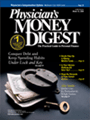Hello, My Name Is Doctor and I'm in Debt
Appearances can often be deceiving. Consider the case of physicians. Many doctors appear to be in great financial shape. They earn a good income that affords them a nice lifestyle. However, a closer look often exposes spiraling debt levels and out-of-control spending habits. So, how does a physician's financial situation get so bad so quickly?
Doctors' Debt Route
Debt accumulation usually starts early in a physician's career with student loans. It then grows as physicians feel pressure to maintain an image or impress colleagues. From there, debt increases can be attributed to feelings of entitlement, stress, or depression. For example, a physician can rationalize spending large amounts of money by focusing on the immediate emotional relief it provides. Impulse purchases can have a similar effect.
The answer:
Tuition payments can also contribute to a physician's debt level. Not planning for their children's education can leave a physician in a terrible financial predicament. With the rising cost of education, physician- parents are often obligated to lend a helping hand at their own expense. What is a physician in debt to do? Get a handle on debt before it gets beyond your control by creating a financial plan that can solve the dilemma.
Mighty Big Baby Steps
The first step to recovery is to organize your debt. Get a recent copy of your credit report to verify all outstanding liabilities. If you find that there are errors or bogus charges, report them immediately. After the initial credit checkup, make a list of your debts and prioritize them by amount and interest rate. Once you know what you owe and what you earn you can develop a plan to reduce your debt load. A strict budget is often too constraining, so set goals that allow you to pay off your debt and live conservatively.
The next step to recovery is to stop increasing your debt. Make a commitment to sacrifice for the cause by eliminating binge spending, cutting up credit cards, reducing standard of living expenses, and skipping expensive vacations. Remember, all of your hard work and sacrifices will be for naught if you continue to splurge on items that are nonessential. Of course, don't expect drastic changes to happen overnight. Large debt loads often take several years to pay off. So be prepared to stay the course.
The last step on the road to recovery is not to neglect your savings—even if the amount you save is relatively small. It's important to establish the habit of saving money instead of spending it. Ideally, physicians should utilize pretax and after-tax savings contributions. However, it's often recommended to pay down high interest rate debt before taking advantage of savings opportunities. Pay yourself before you pay anyone.
Rocky Road to Recovery
Admitting that a problem exists is a very tough thing to do. Oftentimes, there are feelings of guilt associated with being in debt. Just remember that you are not a failure because you are having financial dif- ficulty. Accept the responsibility and work on the solution. At times the situation will seem hopeless. When it starts to feel this way just remember that the solution takes time and continuous effort. Seek the advice of a financial professional in your area for help in analyzing your particular situation.
William B. Howard, Jr, is president of William Howard & Co Financial Advisors, Inc, a fee-only investment and financial planning firm in Memphis, Tenn. He has 23 years of experience working with physicians and was named one of the top 150 advisors. He welcomes questions or comments at 901-761-5068 or whoward@whcfa.com.
